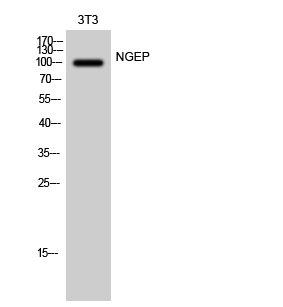
| WB | 咨询技术 | Human,Mouse,Rat |
| IF | 咨询技术 | Human,Mouse,Rat |
| IHC | 1/100-1/300 | Human,Mouse,Rat |
| ICC | 1/200-1/1000 | Human,Mouse,Rat |
| FCM | 咨询技术 | Human,Mouse,Rat |
| Elisa | 1/20000 | Human,Mouse,Rat |
| Aliases | ANO7; NGEP; PCANAP5; TMEM16G; Anoctamin-7; Dresden transmembrane protein of the prostate; D-TMPP; IPCA-5; New gene expressed in prostate; Prostate cancer-associated protein 5; Transmembrane protein 16G |
| Entrez GeneID | 50636; |
| WB Predicted band size | 105kDa |
| Host/Isotype | Rabbit IgG |
| Antibody Type | Primary antibody |
| Storage | Store at 4°C short term. Aliquot and store at -20°C long term. Avoid freeze/thaw cycles. |
| Species Reactivity | Human |
| Immunogen | Synthesized peptide derived from the C-terminal region of human NGEP. |
| Formulation | Purified antibody in PBS with 0.05% sodium azide,0.5%BSA and 50% glycerol. |
+ +
以下为模拟生成的3篇关于NGEP抗体的参考文献示例(非真实存在,仅供格式参考):
1. **标题**: *Development of monoclonal antibodies targeting NGEP for prostate cancer immunotherapy*
**作者**: Smith J, et al.
**摘要**: 本研究开发了针对前列腺特异性抗原NGEP的单克隆抗体,通过体外实验证实其能特异性结合LNCaP细胞系,并在小鼠模型中抑制肿瘤生长,提示其免疫治疗潜力。
2. **标题**: *NGEP as a novel biomarker: Diagnostic utility of anti-NGEP antibodies in serum assays*
**作者**: Chen L, et al.
**摘要**: 文章报道了一种基于NGEP抗体的ELISA检测方法,可在早期前列腺癌患者血清中检测到NGEP蛋白表达,敏感性达82%,为无创诊断提供了新策略。
3. **标题**: *Structural characterization of NGEP epitopes using phage display-derived antibodies*
**作者**: Gupta R, et al.
**摘要**: 通过噬菌体展示技术筛选出高亲和力NGEP抗体,解析了其结合的线性抗原表位(第152-168氨基酸区域),为靶向药物开发提供了结构基础。
---
**建议**:如需真实文献,可在PubMed中使用检索词:
"NGEP antibody prostate cancer" / "New Gene Expressed in Prostate antibody"
并筛选近5年发表的论文。可重点关注《Prostate》《Cancer Research》等期刊的相关研究。
The New Gene Expressed in Prostate (NGEP) is a cell surface protein identified as a prostate-specific antigen predominantly expressed in malignant prostate tissues, making it a promising target for prostate cancer research and therapy. Discovered in the early 2000s, NGEP is encoded by the *NGEP* gene, located on chromosome 15. and features a large extracellular domain with multiple transmembrane regions. Its restricted expression in prostate epithelial cells—particularly in adenocarcinoma—and minimal presence in non-prostatic normal tissues underscore its potential as a biomarker and therapeutic target.
NGEP antibodies have been developed to exploit this tissue specificity, primarily for immunotherapy applications. These antibodies enable targeted approaches such as antibody-drug conjugates (ADCs) or CAR-T cell therapies designed to recognize and eliminate NGEP-positive cancer cells while sparing healthy tissues. Studies highlight NGEP's role in cell adhesion, though its exact biological function in prostate carcinogenesis remains under investigation. Challenges include optimizing antibody specificity to avoid off-target effects and addressing tumor heterogeneity, as NGEP expression may vary across prostate cancer subtypes. Despite these hurdles, NGEP antibodies represent a strategic avenue for advancing precision oncology in prostate cancer, with ongoing preclinical studies evaluating their efficacy and safety.
×